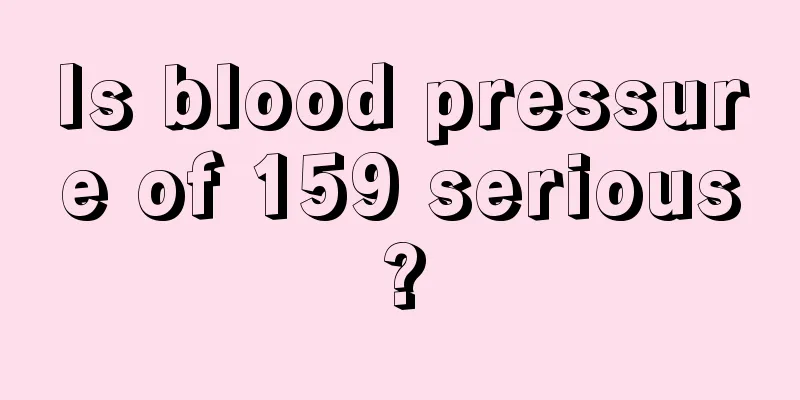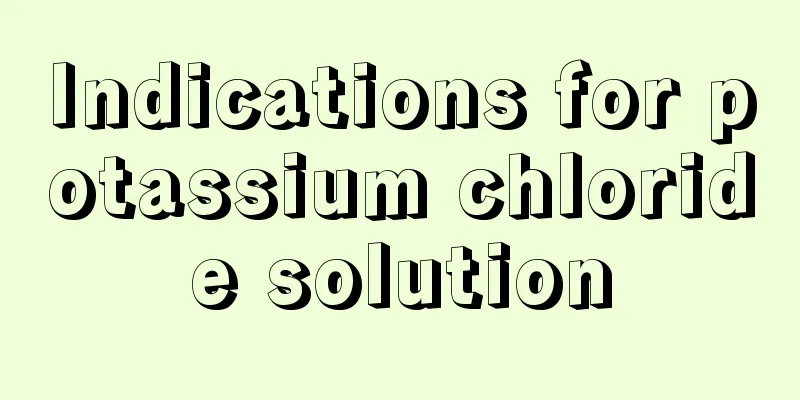Is blood pressure of 159 serious?

|
The blood in the body's blood vessels needs blood pressure to push it, but the blood pressure of normal people will be controlled within the normal range. Otherwise, high or low blood pressure will cause serious consequences of disease. Therefore, in order to prevent the occurrence of blood pressure diseases, blood pressure must be measured regularly. An adult's blood pressure should be controlled between 60 and 120. If it exceeds 120, it is considered high blood pressure. How serious is it if the blood pressure index is 159? Is 159 considered high blood pressure? Hypertension is a disease characterized by increased systemic circulation and arterial blood pressure. Systolic blood pressure is greater than or equal to 140 mmHg, diastolic blood pressure is greater than or equal to 90 mmHg, and may be accompanied by clinical syndromes of functional and organic damage to the heart, brain, kidneys, and other organs. Hypertension is the most common chronic disease and the main risk factor for cardiovascular and cerebrovascular diseases. 159 is considered mild hypertension. If there are no other symptoms, you can temporarily stop taking medication and make adjustments to your diet. You should eat a low-fat, low-salt, light diet, control your weight, exercise properly, and avoid consuming too much food with high cholesterol content, especially animal offal. 7 principles for treating mild hypertension 1. Control your weight Overweight people should try to lose weight, which is the best way to lower blood pressure. Japanese research data also believe that obesity is the main cause of hypertension, and 80% of hypertensive patients can lower their blood pressure by losing weight. Chinese medical scientists point out that whether it is a patient with hypertension or an obese person with normal blood pressure, losing weight can lower blood pressure, slow heart rate, reduce plasma uric acid, cholesterol and blood sugar, and can also reduce medication dosage. 2. Exercise Doing gymnastics or exercise for 20 minutes at least 3 times a day can improve blood pressure. Experiments have shown that 20 to 30 minutes of uninterrupted walking exercise, equivalent to walking 4,000 to 5,000 meters per hour, can enable the cardiovascular system to continuously deliver fresh blood and oxygen throughout the body, enhance the function of the heart, lungs and muscles, promote blood circulation throughout the body, and lower blood pressure levels. At the same time, patients with hypertension can also try jogging according to their own conditions. Long-term jogging exercises can steadily lower blood pressure, enhance digestive function, and alleviate symptoms. If patients with hypertension can insist on jogging every day, it will help to keep the meridians of the whole body unobstructed and delay the occurrence of complications such as arteriosclerosis. 3. Limit Salt Under normal circumstances, the human body's physiological requirement for sodium is only 2 to 3 grams per day, but the actual salt content in the diet is as high as 10 to 15 grams. It is advisable that the daily salt intake for patients with hypertension should not exceed 5 grams. If the amount is too low, it will be difficult for patients to accept. Practice has shown that in patients with early-stage hypertension or mild hypertension, simply restricting salt intake may restore blood pressure to normal. For patients with moderate to severe hypertension, limiting salt intake can not only improve the efficacy of other antihypertensive drugs, but also reduce the dosage of antihypertensive drugs, which can greatly reduce the side effects of antihypertensive drugs and drug costs. 4. Proper potassium supplementation Daily intake of 5 to 7 grams of potassium can lower blood pressure by 4 to 9 mmHg. Others have found in animal experiments that even if increasing potassium intake does not show the effect of lowering blood pressure, it can prevent the occurrence of cerebral stroke, ventricular hypertrophy, and renal dysfunction, and reduce the mortality rate caused by hypertension complications. Therefore, patients with hypertension should supplement potassium appropriately. Fruits, vegetables, beans, etc. are foods rich in potassium. Patients with hypertension can eat more of them. 5. Take calcium supplements Epidemiology in our country has also confirmed that the average daily calcium intake of the population is significantly negatively correlated with blood pressure levels. That is, those who consume more calcium per day have lower blood pressure, while those who consume less have higher blood pressure. For every 100 mg increase in the average daily calcium intake of the population, the average systolic blood pressure level can decrease by 0.33 kPa (2.5 mmHg) and the diastolic blood pressure level can decrease by 0.17 kPa (1.3 mmHg). Therefore, researchers point out that reduced calcium absorption is one of the causes of hypertension. Research in the past decade has confirmed that insufficient calcium in the diet can cause high blood pressure. Therefore, paying attention to the supply and absorption of calcium in the diet early is beneficial for the prevention and treatment of hypertension. Foods rich in calcium include soybeans and soy products, milk and dairy products, fish, shrimp, crab, eggs, fungus, seaweed, and snow vegetable, etc. We should pay attention to their appropriate intake in daily life. 6. Limit alcohol consumption and quit smoking Drinking alcohol can increase blood pressure by increasing the level of corticosteroids catecholamines, affecting the effects of angiotensin, vasopressin and aldosterone, and affecting the fluidity of cell membranes. At the same time, frequent drinking also affects drug treatment, and blood pressure is difficult to control. Therefore, patients with hypertension should limit their alcohol consumption. It is best to limit the amount of alcohol consumed to less than 25 grams per day, or it is best not to drink alcohol. Low-alcohol beer should also be controlled. Epidemiological surveys have found that the incidence of malignant hypertension in smokers is significantly increased, and it may also increase the risk of coronary heart disease and sudden death, so they should quit smoking. 7. Stay positive Long-term mental stress and depression leading to sleep disorders are one of the important causes of hypertension and some other chronic diseases. Modern medical research has proved that all adverse mental stimuli such as sorrow, sadness, anxiety, irritability, etc. can increase the secretion of vasoactive substances such as catecholamines in the blood and increase blood pressure. Therefore, patients with hypertension should pay attention to controlling their emotions, eliminating distracting thoughts, maintaining a good mood and psychological balance. These are all conducive to maintaining the normal functions of the higher nerve centers and are beneficial to lowering blood pressure. |
<<: Is blood pressure 129 normal?
>>: How do thin people keep fit?
Recommend
What are the symptoms of skin cancer
The incidence of skin cancer in my country is ver...
Is there a complete cure for bile duct cancer?
We cannot generalize everything, especially when ...
How to wash off the juice from pomegranate peel
Pomegranate is a fruit that everyone is very fami...
TCM Syndrome Differentiation and Treatment of Pancreatic Cancer
Pancreatic cancer is often classified as "ac...
Reasons why the car air conditioner does not cool
With the arrival of summer, the weather is gettin...
There are red spots on my back, what's going on?
If there are always red spots on the back, you sh...
Six commonly used examination and diagnosis methods for bladder cancer
Bladder cancer is a common tumor that mainly occu...
Is lung metastasis of breast cancer a solid nodule?
Breast cancer is a condition in which mammary epi...
What is the difference between liver hemangioma and liver cancer? There are four differences
Liver hemangioma and liver cancer are two differe...
How soon can a newborn be taken out?
As we all know, women need to stay in confinement...
Bowel cancer is likely to be age-related
Bowel cancer is likely to be age-related, and is ...
How much does it cost to treat advanced liver cancer? What are the advantages of local resection of liver cancer?
How much does it cost to treat advanced liver can...
Don't get pregnant during radiotherapy for laryngeal cancer
Wang Xiao and her husband Zhang Xin have been mar...
What to do with shoulder pain, comprehensive treatment with traditional Chinese medicine is effective
Shoulder pain is common among middle-aged and eld...
Can I use calamine lotion if I am allergic to it?
Allergies are quite common in normal times. There...









